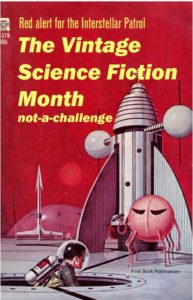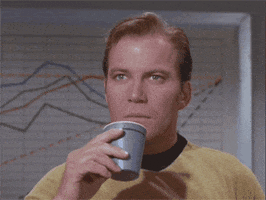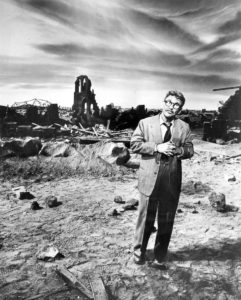Vintage Science Fiction month takes place every January, and has a few guidelines:
– read, watch, listen to, or experience something science fiction / fantasy that was created in 1979 or earlier
– talk about it online sometime in January
– have fun
If any of my readers are interested in participating\ use the hashtag #VintageSciFiMonth or tag @VintageSciFi_ or @redhead5318 on Twitter if you’d like your posts to be included in the official retweets and roundups.
 Title: The Future Is Female
Title: The Future Is Female
Author: Lisa Yaszek (Editor)
Publisher: Library of America
Publication Date: September 25, 2018 for this anthology. All stories in it were originally published between 1928 and 1969.
Genres: Science Fiction
Length: 432 pages
Source: I borrowed it from the library.
Rating: 3 Stars
Blurb:
Space-opera heroines, gender-bending aliens, post-apocalyptic pregnancies, changeling children, interplanetary battles of the sexes, and much more: a groundbreaking new collection of classic American science fiction by women from the 1920s to the 1960s
SF-expert Lisa Yaszek presents the biggest and best survey of the female tradition in American science fiction ever published, a thrilling collection of twenty-five classic tales. From Pulp Era pioneers to New Wave experimentalists, here are over two dozen brilliant writers ripe for discovery and rediscovery, including Leslie F. Stone, Judith Merril, Leigh Brackett, Kit Reed, Joanna Russ, James Tiptree Jr., and Ursula K. Le Guin. Imagining strange worlds and unexpected futures, looking into and beyond new technologies and scientific discoveries, in utopian fantasies and tales of cosmic horror, these women created and shaped speculative fiction as surely as their male counterparts. Their provocative, mind-blowing stories combine to form a thrilling multidimensional voyage of literary-feminist exploration and recovery.
Review:
Content warning: War, radiation, pregnancy, childbirth, pandemics, sex reassignment surgery, kidnapping, and birth defects. I will be discussing pregnancy, radiation, and birth defects in my review.

Buckle up for a wild ride.
I can’t review all of the stories in this collection in my review, so I’ll pick a few of the most interesting ones.
Leslie Perri’s “Space Episode” began with the terror some astronauts felt at the exact moment they realized that they’d either need to find a way to dislodge the meteor stuck in their engine immediately or crash onto Earth and die. There wasn’t even time to share the characters’ names with the audience in that scene, and yet I immediately sympathized with them and couldn’t stop reading until I’d found out their fates.I can’t say much else about the storyline without giving away spoilers, but I thought was well paced and exciting. While I must continue being vague, the ending also had a nice twist in it that made me wish for a sequel.
Margaret’s fear of having accidentally exposed her fetus to dangerous amounts of radiation was overwhelming in “That Only a Mother” by Judith Merrill. It wasn’t difficult to figure out where the plot was going from there, so I was mostly interested in Margaret’s character development as she went through her pregnancy and began adjusting to being a new mom. I found myself wishing I could sit down with the author to confirm whether this was what she was hoping her audience would do given how easy it was to guess what would happen next. Then again, maybe this sort of storyline was much less used in the 1940s and would have been fresher for readers back then!
I was intrigued by Alice Eleanor Jones’ “Created He Them” immediately. The main character lived in a society where many necessities of life were difficult to get, from eggs to new clothes. She had two young sons to look after and was increasingly having difficulty keeping everyone in her family fed and warm. I’ll leave it up to other readers to discover more about her world, but I thought it was a memorable (if also depressing) place that could have easily been expanded into a full-length novel.
The Future Is Female was a memorable introduction to plenty of vintage science fiction authors I’d never heard of before.

 Vintage SciFi Month was created by
Vintage SciFi Month was created by 
 Many of the shows we watched were old enough to have sold rerun rights to public TV or to channels that could be tuned into if you had a good antenna. This means that my first taste of vintage science fiction might have been a little out of the ordinary for the average kid my age.
Many of the shows we watched were old enough to have sold rerun rights to public TV or to channels that could be tuned into if you had a good antenna. This means that my first taste of vintage science fiction might have been a little out of the ordinary for the average kid my age.